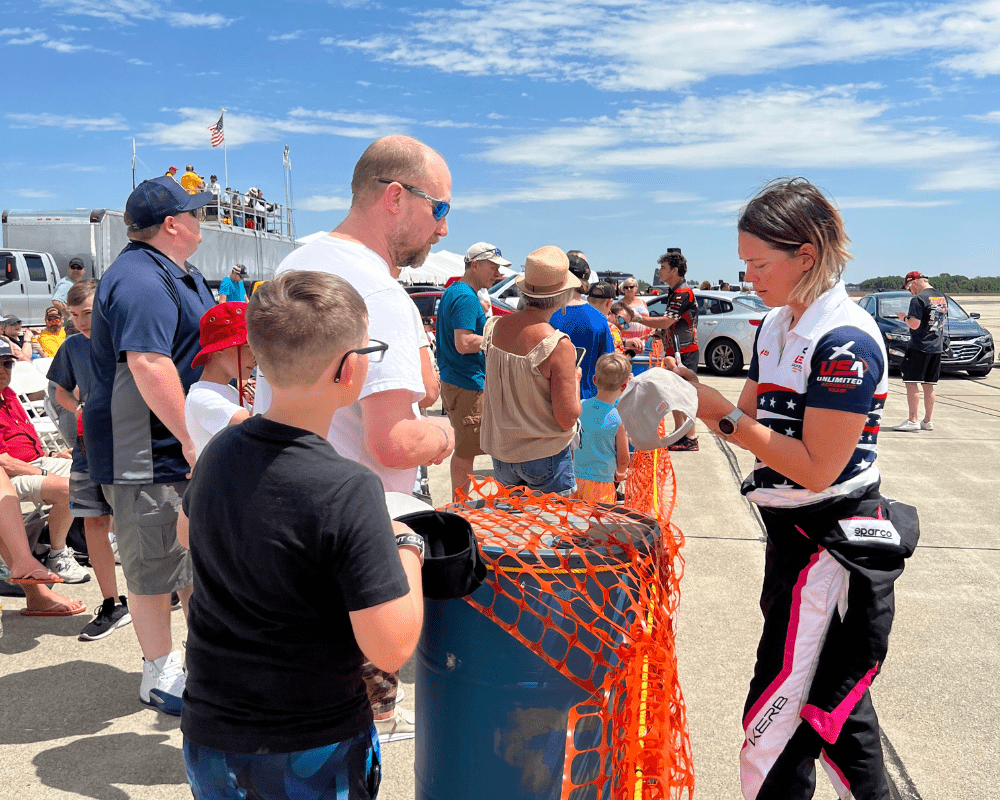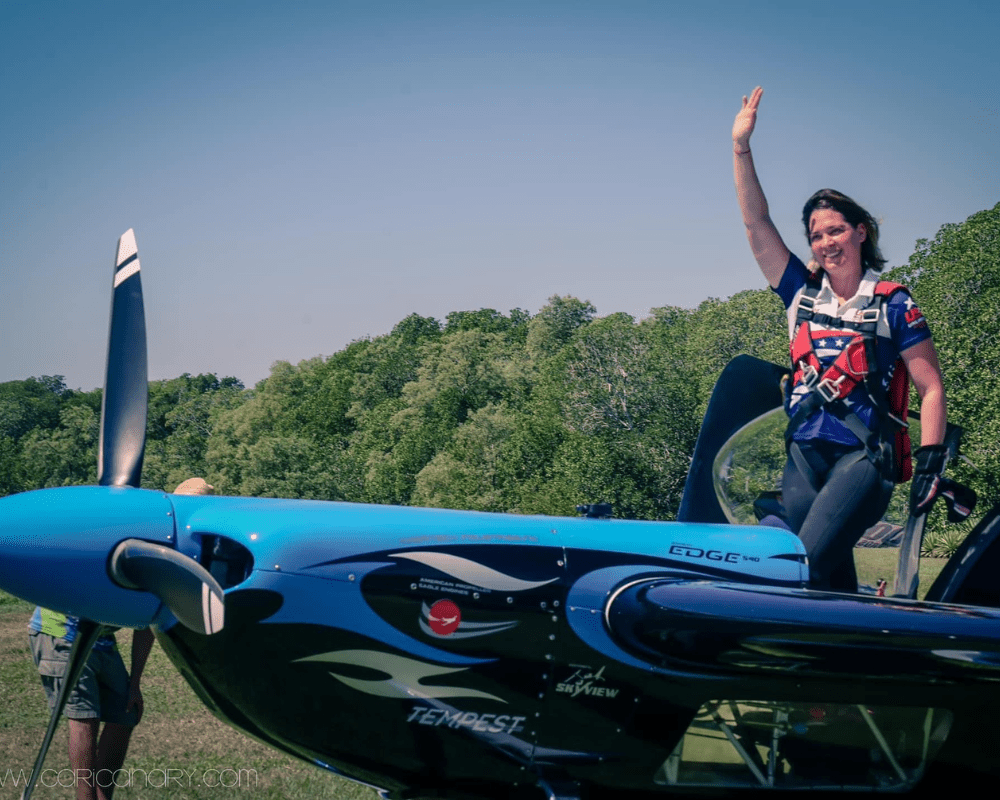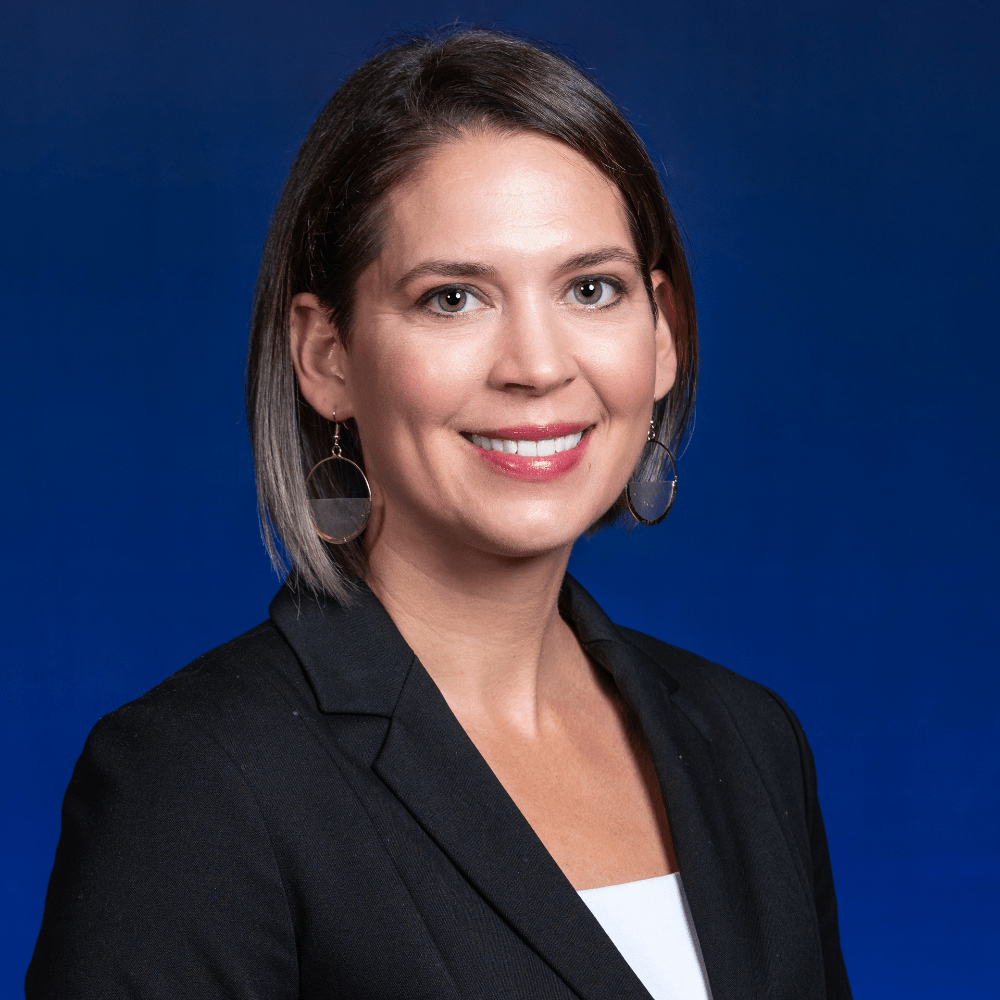

Eagle on the Edge: Accomplished Aviation Professor Aims to Make Safety Second Nature for Students

- Title: Assistant Professor of the Practice
- Department: College of Aviation
- Employer: Embry-Riddle Aeronautical University
As an extreme sports icon and working airline pilot, this alumna turned assistant professor offers a real-life example of aviation safety.
When it comes to safety in the skies, Embry-Riddle professor and alumna Melissa Burns sets a high standard for students to follow.
As the youngest ever member of the United States Unlimited Aerobatic Team, an accomplished airshow pilot, a skydiver, SCUBA diver, BASE jumper and now a first officer with Alaska Airlines, Burns has based her success — and her survival — on an unwavering dedication to staying safe.
“I have a passion for safety,” said Burns, Assistant Professor of the Practice for the Worldwide Campus College of Aviation and formerly the Program Coordinator of the Bachelor of Science in Pilot Operations and Associate Program Coordinator for the M.S. in Aviation Safety programs. “Safety allows us to exercise the privilege of aviation, and I am excited to help develop safety programs that address the day-to-day situations students are experiencing.”
Finding Rewards While Mitigating Risks
Her penchant for pushing the envelope, which began when she was a girl growing up in Pittsburgh, Pennsylvania, required that she learn how to balance risk and reward, a skill she refined over the years as she began branching out as a pilot and an extreme sports athlete.
“You need to go out there and take a little bit of that risk, in a good kind of way,” Burns said. “Getting to the edge of your comfort level helps you create opportunities for yourself.”
While her “comfort level” differs from that of many people, the experience she’s gained from testing her limits provides a well-rounded and unique perspective on safety that Burns now shares with students.
“If we create truly relevant material, we make our classes something that students will go back and talk about with their friends,” said Burns. “We want them to tell other students: ‘You have to take this class.’”
Safety Focus Started Early
Burns began her aviation journey as a little girl, flying with her grandmother Mary Lou Waite in a Cessna 150 Aerobat and getting a brief intro to basic manuevers. After she graduated high school, her granddad Leo Janssens, a longtime Air Force and FAA test pilot who knew a thing or two about pushing boundaries, taught her to fly.
In addition to her love of aviation, Burns also developed a taste for competitive rock climbing, something she says came courtesy of her father, Max Andrzejewski.
“My dad was the guy riding his Harley around with his climbing and diving gear on the back,” said Burns, who learned to SCUBA dive while she and her father dredged for gold in California. “I was working underwater with him, with a big weight belt and hard boots on, digging holes and finding gold.”
While she consistently challenged herself outside, Burns was also focused on classroom learning as well, and her stellar high school grades could have gotten her into pretty much any college in the U.S.
But she only applied to one place: Embry-Riddle’s Prescott Campus.
Why Choose the Prescott Campus?
“It has great weather, which we did not have in Pittsburgh,” said Burns. “It has first-rate aviation programs, a climbing club and plenty of mountains. I remember when we first drove into Prescott, I looked at my dad and said: ‘I’m home.’’’
Burns also met Bill Thompson, the faculty advisor for the Embry-Riddle Bouldering Crew, aka the climbing club, and said he was “one of the people who really encouraged me to attend Embry-Riddle and continued to be a mentor throughout my college career. He then became the head of Alumni Services, and we worked together at the Daytona Beach Campus almost 20 years later.”
As you may expect, though, her experience as a college student didn’t turn out to be strictly “normal.” After her junior year, Burns’ love of aerobatic flying led her to start working with retired Air Force Maj. Gen. Hank Canterbury and the renowned aviator taught her to fly a Pitts Special, a biplane built for aerobatics.
“That’s when I learned you could compete in aerobatics,” she said. “I said: ‘Ok, I want to do that.’”
Her training in California was intense, so Burns put her academic career on hold while she pursued this new aviation goal.
“It was something I thought I would do for fun,” she said. “But I kept having these incredible opportunities and people who were supporting me, and next thing I knew, I was flying air shows full time.”
Success in the Skies
When she was 22, Burns tried out for and made the United States Unlimited Aerobatic Team. She had also discovered skydiving, BASE jumping and wingsuit flying as she and her first husband became extreme sports icons.
Burns was crowned as Fastest Woman in the World at the World Champion Wingsuit B.A.S.E. Jumping Race in Norway in 2015 and has won multiple world flight medals at the World Aerobatic Championships over the years, including a third-place overall finish in France.
But no matter what she did, Burns always remembered Embry-Riddle, the degree program she left behind, and her promise to grandmother Mary Lou, who firmly believed in the power of higher education and encouraged all her kids and grandkids to finish college.


In 2013, thanks to online classes offered through the Worldwide Campus, Burns earned her B.S. in Aeronautics. In 2015, she was named an inductee to the Embry-Riddle Prescott Campus Chancellor's Hall of Fame while performing during the Wings Out West Air Show at the October West Alumni Event.
While flying at the Elmendorf AFB Air Show in Alaska in 2016, she met a local pilot named Trent Burns, and a romance bloomed. Soon, the pair were splitting time between Alaska and Florida as husband and wife and thinking about starting a family.
After spending most of 2017 flying for a Part 135 operator transporting climbers and tourists to and from the glaciers in Denali National Park and flight instructing on floats and skis in Alaska, Burns gave birth to daughter Isla Sky Burns on Nov. 5, followed two years later by son Koa Dean Burns, who also arrived on Nov. 5.
After the pandemic began, Burns and her husband (who was by now working as an aerial firefighter), decided to settle in Florida to see it through.
MBAA Launches a New Career Phase
At the urging of Dr. Frank Ayers, former Chancellor of the Prescott Campus and currently a Professor in the College of Aviation at the Daytona Beach Campus, Burns continued her education through the school’s Master of Business in Aviation Administration and graduated in 2021.
Embry-Riddle Associate Professor Carolina Anderson then suggested that Burns apply to join Embry-Riddle’s faculty. Before long, she became part of the College of Aviation team on the Daytona Beach Campus.
Burns was then transferred to the Worldwide Campus College of Aviation faculty team, which allowed her to expand her aviation experience further and apply as a pilot for Alaska Airlines, something she had never imagined she would do. She moved her family to the state of Washington, where Trent Burns was able to home base as a pilot for NetJets.
“The move to the Worldwide Campus gave me the freedom to get back into flying full-time and to see a part of the industry that I had not worked in before,” Burns said. “I felt this would help me to gain better industry experience for all our students.”
“I love the culture at Alaska Airlines,” added Burns, who is now flying the Boeing 737 and still doing airshows in her EDGE 540 aircraft. “It reminds me a lot of working with the College of Aviation at Embry-Riddle. I've never done the traditional route, but I saw that [Alaska Airlines] sought out pilots like me, and now I fly with captains who have these super unique backgrounds. I think from having that mix of experience, that's why we're one of the safest and most successful airlines.”
Setting a High Bar for Safety
Although she is as busy as she has ever been, Burns dedicates her time in front of the class to sharing a unique blend of skills, knowledge and commitment to safety.
“I have extremely supportive leadership teams at Embry-Riddle and Alaska Airlines, and they appreciate my experience,” she said. “I have been part of so many areas of aviation, and that is something I can bring into the classroom or onto the flight deck.”
Amid all she’s learned from her years at the peak of the aviation pantheon, Burns says safety will always be the most important takeaway.
“I want to set that example,” she said. “I want to teach my students that building a culture of safety and doing things right is really the key to success in aviation.”
To learn more about Professor Burns or catch her at a future airshow, visit her website at www.sportsgal.com.

EMBRY-RIDDLE EXPERTISE
Melissa Burns uses her vast and varied aviation experience to improve safety education at Embry-Riddle.

